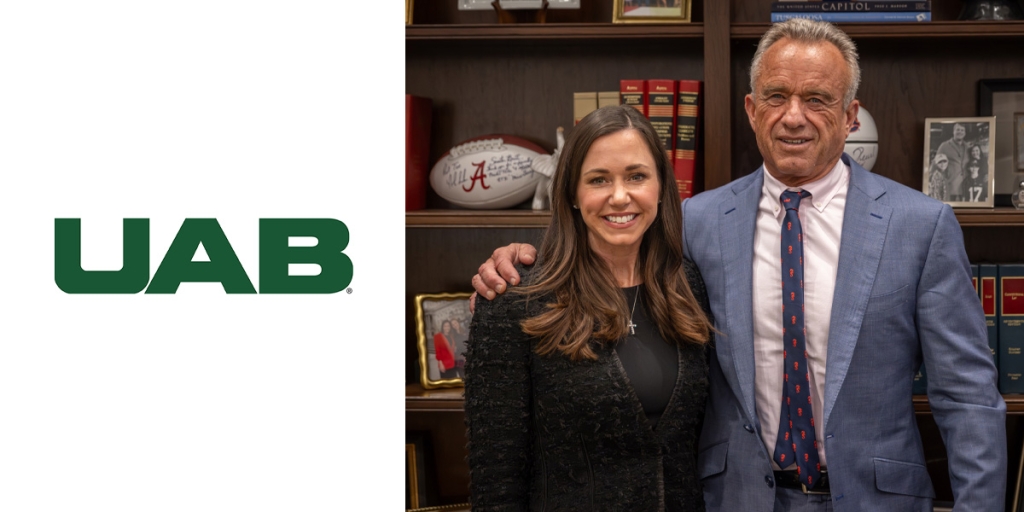The University of Alabama at Birmingham (UAB) is already considered a national leader in precision medicine. Now, the university has proposed a project that could transform the Birmingham metropolitan area — and the entire state — for generations to come. The only catch? A final portion of funding from the State of Alabama is needed to make the project a reality.
First, some background.
Precision medicine focuses on individual patients to understand how their lifestyles, behavior, environment and genetics interact to affect their health. More importantly, precision medicine allows a systematic approach to integrate these key factors into the prevention, diagnosis and treatment of disease — all tailored to each and every individual patient.
Essentially, what UAB does in its world-class precision medicine practice — in partnership with top-notch Alabama entities like HudsonAlpha and Southern Research — is: (1) sequence a patient’s whole genome or a specific tumor’s genome; (2) then evaluate that sequence for a mutation(s); (3) use a massive and continually growing database to determine what effect any given mutation has on a patient; (4) cross-reference that mutation with all known compounds or drugs to (5) determine a treatment plan for the patient’s condition.
This process cures rare diseases on a regular basis. The story of UAB’s own Matt Might, considered a preeminent international leader in the field, epitomizes what precision medicine is all about.
Between May 2016 and April 2019, UAB’s precision medicine practice successfully developed research plans for 90 patients who were each previously believed to have an “undiscoverable” rare disease. Additional patients were also referred directly to an appropriate program or specialist through UAB’s precision medicine process.
Moreover, UAB (through the Alabama Genomic Health Initiative) has repurposed approximately 10 existing medications for treating new disorders through the precision medicine practice. Examples are as simple as over-the-counter medications like Prevacid that UAB has discovered can be repurposed to treat a rare disease.
Impact — ‘Once in a lifetime opportunity’
Simply put, the results have been staggering just in the first few years of UAB’s precision medicine focus.
However, this could be merely the beginning — a prelude to historic things to come.
To really establish itself as the unequivocal global leader in genomic medicine and data sciences, UAB is committed to renovating and outfitting a state-of-the-art genomics facility.
The university has already secured a generous $10 million donation from Lee Styslinger III and the Altec-Styslinger Foundation. As such, UAB plans to name the building the “Altec-Styslinger Genomic Medicine and Data Research Building.”
UAB has further secured $8 million in federal funding.
Yet, to get the facility done, another $50 million is needed. UAB is asking the state for this amount through an Alabama Public School and College Authority bond issue. Governor Kay Ivey chairs the authority.
The university also plans to pursue local government funding from both the City of Birmingham and Jefferson County.
The University of Alabama System, in which UAB is one of three campuses, argues that the payoff on the requested $50 million in funding for the state would be unquestionably worth it in multiple ways.
First, the most tangible way is the estimated economic benefits of the project.
With this facility in place, UAB would recruit 50 researchers and an additional 300 support staff, meaning 350 high to very high paying jobs would be created. The university would spend $75-100 million recruiting this top talent over the next seven or eight years. UAB projects those researchers, when collaborating with the intuition’s existing Hugh Kaul Precision Medicine Institute and Alabama Genomic Health Initiative, can generate $75-85 million in new funding.
Ultimately, leaders within the UA System believe that Birmingham would be set to become the “Silicon Valley of Biomedicine” with the facility operational.
Each rare disease discovered or treatment plan formed could, in itself, become a large spin-off healthcare startup company based in the Magic City. This has already happened once in the first few years of the precision medicine practice in the form of a leukemia drug screening service that identifies the best possible treatment for each individual leukemia patient.
At a meeting of the UA System’s board of trustees Friday at UAB, UA System Chancellor Finis St. John said that the UAB genomics facility could have a transformational impact on the Yellowhammer State similar to the likes of NASA and Redstone Arsenal, Mercedes-Benz and the Port of Mobile. He called the project a “once in a lifetime opportunity.”
St. John said this is an opportunity “to improve the lives of our citizens in a way which may never occur again.”
Watch his powerful remarks:
St. John’s urgency was echoed by each trustee on Friday. Board members made passionate pleas for the state to support this unprecedented effort.
For the people, and the future, of Alabama
It should also be noted that it is not just officials associated with UAB or the UA System leading the charge on this project.
Every member of the Jefferson County state legislative delegation (who essentially never unanimously agree on anything) has signed a letter of support for the project, calling for the facility to be funded.
Senators wrote in their respective joint letter in 2019, stating, “The economic impact of this project cannot be overstated.”
This letter was authored by Senate Rules Committee Chairman Jabo Waggoner (R-Vestavia) and signed by Senate Majority Leader Greg Reed (R-Jasper), State Sen. Rodger Smitherman (D-Birmingham), State Sen. Linda Coleman-Madison (D-Birmingham), State Sen. Shay Shelnutt (R-Trussville), State Sen. Dan Roberts (R-Mountain Brook) and State Sen. Priscilla Dunn (D-Bessemer). House members signed onto a separate letter echoing similar sentiments, and U.S. Senator Richard Shelby (R-AL) backs the project and helped secure the federal funding component.
Here is a snippet from the state senators’ letter:
Waggoner attended the board of trustees meeting on Friday to emphasize his staunch support for the project.
“The State can provide this support (the requested funding), and the State should provide this support because nothing that the State could do [with the funding] would be more important to the future of this state,” St. John said. “This is not a project to benefit UAB. It’s not a project to even benefit the University of Alabama System. It is a project for the future of the citizens of Alabama.”
Because, while the economic impact of the project could be unparalleled, there is a bigger factor in play, the greatest of them all: people’s lives.
Ivey has said that “every life is a sacred gift from God.”
UAB’s genomics facility would undoubtedly save countless lives — and improve the quality of others. That return on investment is quite simply priceless.
Sean Ross is the editor of Yellowhammer News. You can follow him on Twitter @sean_yhn














